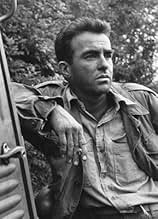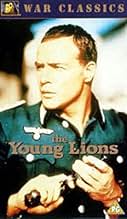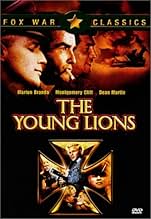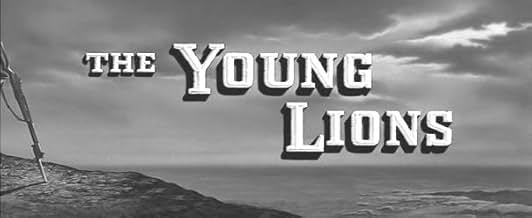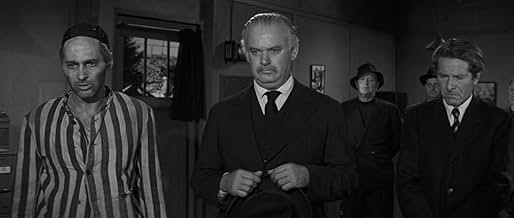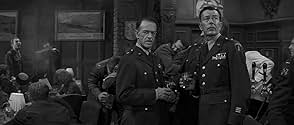AVALIAÇÃO DA IMDb
7,1/10
9,4 mil
SUA AVALIAÇÃO
As vidas de três jovens, um alemão e dois americanos, durante a Segunda Guerra Mundial.As vidas de três jovens, um alemão e dois americanos, durante a Segunda Guerra Mundial.As vidas de três jovens, um alemão e dois americanos, durante a Segunda Guerra Mundial.
- Direção
- Roteiristas
- Artistas
- Indicado a 3 Oscars
- 1 vitória e 7 indicações no total
John Alderson
- Cpl. Kraus
- (não creditado)
John Banner
- German Town Mayor
- (não creditado)
Stephen Bekassy
- German Major
- (não creditado)
- Direção
- Roteiristas
- Elenco e equipe completos
- Produção, bilheteria e muito mais no IMDbPro
Avaliações em destaque
I have seen this movie several times and catch something different every time I see it. Today is the first time I've seen it from the beginning. In the context of the time it was made, it was a bold statement about the human factor in any war. Brando shines and plays a sympathetic character who sees first hand the evil that men do in the name of patriotism.
Made at a time when the Americans that liberated the concentration camps were in their prime and there weren't any idiots running around claiming it was a lie, we see how ordinary citizens respond to the unthinkable. Brando's character stands in for the citizens of the Reich who claimed they were clueless about the genocide while the ashes from the smokestacks fell like snow on their towns. We see the horror and the denial.
It briefly explores a major taboo--interracial/interfaith marriages. It looks at racism in the context of anti-Semitcism (unfortunately still alive and well in America) and one man's courage in opposing it. Ironic this brand of racism, as the founder of the prevelant religion in America was a Jewish rabbi.
This movie is worth the 3 hours of time; it would make a great set piece with "Judgement at Nuremberg" which also showcases the talents of many of the actors from this film.
Good acting from all players in this film. It presages Robert Altman with the interweaving of the characters' lives from the first shot where Barbara Rush and Brando debate the merits of the Fatherland to the last scene in the forest where the end comes full circle.
Made at a time when the Americans that liberated the concentration camps were in their prime and there weren't any idiots running around claiming it was a lie, we see how ordinary citizens respond to the unthinkable. Brando's character stands in for the citizens of the Reich who claimed they were clueless about the genocide while the ashes from the smokestacks fell like snow on their towns. We see the horror and the denial.
It briefly explores a major taboo--interracial/interfaith marriages. It looks at racism in the context of anti-Semitcism (unfortunately still alive and well in America) and one man's courage in opposing it. Ironic this brand of racism, as the founder of the prevelant religion in America was a Jewish rabbi.
This movie is worth the 3 hours of time; it would make a great set piece with "Judgement at Nuremberg" which also showcases the talents of many of the actors from this film.
Good acting from all players in this film. It presages Robert Altman with the interweaving of the characters' lives from the first shot where Barbara Rush and Brando debate the merits of the Fatherland to the last scene in the forest where the end comes full circle.
"The Young Lions" was one those big Hollywood war movies I remember seeing with my family at the local cinema during the late 1950s.
I saw many of those films and actually read most of the slab-like novels they were based on: "Battle Cry", "The Man in the Gray Flannel Suit", "From Here to Eternity" and Irwin Shaw's "The Young Lions" - there just weren't that many competing devices back then.
I usually read the books after seeing the films and then became acutely aware of how the movies suffered under the censorship of the day. The novels often filled in some serious gaps in my sex education, but the films never did.
The story is about three soldiers: a German, Christian Diestl (Marlon Brando), and two Americans: Noah Ackerman (Montgomery Clift) and Michael Whiteacre (Dean Martin). The film follows their fortunes through WW2 until they cross paths at the end.
The film has a number of authentic, well-executed sequences shot on location. However these are mixed with flat, over-lit scenes shot on the blandest of backlots and soundstages - the interiors are particularly artless. Documentary footage also added to the lack of a definitive style.
Fortunately the action scenes open the film out. The most arresting of them was the ambush of a British convoy in North Africa. It would have touched a nerve with many in that audience in 1958 as our guys had been part of the British Eighth army and the war had only been over for 13 years.
One of the surprises in the movie was the anti-Semitism Noah Ackerman encounters in the U.S. Army. Monty Clift faced a tough enlistment in "From Here to Eternity", but it was even tougher here. He looked worn (this was after his accident in 1956) and seemed a bit too old, but his performance is the most affecting in the film. No wonder Brando was wary of his talent.
Dean Martin without Jerry Lewis was another surprise, but he was good as the soldier with better motives than he thought.
Brando's blonde, broad shouldered Diestl starts out as a fine example of the master race, but his journey through the rise and fall of the Third Reich makes him thoughtful. He is treated rather sympathetically in the movie, although he was more of a nasty Nazi in the novel. However they may have overdone Diestl's disgust at every turn.
I can see why Irwin Shaw was disappointed. However the film has its moments, and is still one I have no trouble watching every now and then.
I saw many of those films and actually read most of the slab-like novels they were based on: "Battle Cry", "The Man in the Gray Flannel Suit", "From Here to Eternity" and Irwin Shaw's "The Young Lions" - there just weren't that many competing devices back then.
I usually read the books after seeing the films and then became acutely aware of how the movies suffered under the censorship of the day. The novels often filled in some serious gaps in my sex education, but the films never did.
The story is about three soldiers: a German, Christian Diestl (Marlon Brando), and two Americans: Noah Ackerman (Montgomery Clift) and Michael Whiteacre (Dean Martin). The film follows their fortunes through WW2 until they cross paths at the end.
The film has a number of authentic, well-executed sequences shot on location. However these are mixed with flat, over-lit scenes shot on the blandest of backlots and soundstages - the interiors are particularly artless. Documentary footage also added to the lack of a definitive style.
Fortunately the action scenes open the film out. The most arresting of them was the ambush of a British convoy in North Africa. It would have touched a nerve with many in that audience in 1958 as our guys had been part of the British Eighth army and the war had only been over for 13 years.
One of the surprises in the movie was the anti-Semitism Noah Ackerman encounters in the U.S. Army. Monty Clift faced a tough enlistment in "From Here to Eternity", but it was even tougher here. He looked worn (this was after his accident in 1956) and seemed a bit too old, but his performance is the most affecting in the film. No wonder Brando was wary of his talent.
Dean Martin without Jerry Lewis was another surprise, but he was good as the soldier with better motives than he thought.
Brando's blonde, broad shouldered Diestl starts out as a fine example of the master race, but his journey through the rise and fall of the Third Reich makes him thoughtful. He is treated rather sympathetically in the movie, although he was more of a nasty Nazi in the novel. However they may have overdone Diestl's disgust at every turn.
I can see why Irwin Shaw was disappointed. However the film has its moments, and is still one I have no trouble watching every now and then.
More than a passing resemblance exists between Clift's Noah and the Robert E. Lee Prewitt of 'From Here to Eternity.' They are both "hard heads,' determined to live by their own special code of honor
The chief difference is that Noah is not alone
Throughout the film, he is accompanied by a friend, who has a number of reasons to be against the war
Also Noah gets the girl of his dreams
He even marries her
'The Young Lions' retains its impact as one of the better films made about war... The combat scenes are limited in scale but brilliantly staged and photographed, with good direction of a complex script and a masterly musical score by Hugo Friedhofer
Director Dmytryk never misses an opportunity to underline how war comes into collision with the destinies of people When Brando encounters May Britt - as the wife of his superior officer, Maximilian Schell - she is the perfect image of Nazi vices: Corrupt, hedonistic, and, of course, condemned along with the rest of the decadent Germans Her hazardous beauty is used as counterpoint to Brando's enthusiasm and beliefs: She represents all that is bad and immoral while he is everything noble and pure
Dmytryk is less awkward depicting the relationship between Clift and Lange: Their Love is a natural condition They belong together Like Robert E. Lee Prewitt, Clift's Noah is ill-at-ease socially When he meets Lange, his reaction is clear, spontaneous, purposeful, direct He begins to babble a lot to make an impression on her, because, as he tells her later, "I was afraid that if I was myself you wouldn't look at me twice." But Hope was gracious enough to attend the guy The young nice girl has at last found her favorite kind of hero
Clift, who finds himself standing up for his rights and for principles he did not even know he had, pared his lines to the minimum needed to convey the essence of Noah Ackerman The prison sequence is a clear and simple proof of it The emotional urgency of the young couple is communicated through looks, small gestures, and soft and tender words of love and caring
Nominated for Best Cinematography, Best music and Best Sound, Dmytryk's motion picture is a moving and eloquent statement of how war collides with the destinies of people and hurls them into a maelstrom
'The Young Lions' retains its impact as one of the better films made about war... The combat scenes are limited in scale but brilliantly staged and photographed, with good direction of a complex script and a masterly musical score by Hugo Friedhofer
Director Dmytryk never misses an opportunity to underline how war comes into collision with the destinies of people When Brando encounters May Britt - as the wife of his superior officer, Maximilian Schell - she is the perfect image of Nazi vices: Corrupt, hedonistic, and, of course, condemned along with the rest of the decadent Germans Her hazardous beauty is used as counterpoint to Brando's enthusiasm and beliefs: She represents all that is bad and immoral while he is everything noble and pure
Dmytryk is less awkward depicting the relationship between Clift and Lange: Their Love is a natural condition They belong together Like Robert E. Lee Prewitt, Clift's Noah is ill-at-ease socially When he meets Lange, his reaction is clear, spontaneous, purposeful, direct He begins to babble a lot to make an impression on her, because, as he tells her later, "I was afraid that if I was myself you wouldn't look at me twice." But Hope was gracious enough to attend the guy The young nice girl has at last found her favorite kind of hero
Clift, who finds himself standing up for his rights and for principles he did not even know he had, pared his lines to the minimum needed to convey the essence of Noah Ackerman The prison sequence is a clear and simple proof of it The emotional urgency of the young couple is communicated through looks, small gestures, and soft and tender words of love and caring
Nominated for Best Cinematography, Best music and Best Sound, Dmytryk's motion picture is a moving and eloquent statement of how war collides with the destinies of people and hurls them into a maelstrom
A long time ago, some time before the powers that be decided that movies should be made only to extricate money from children by catering to their base instincts and in so doing destroy our civility, the American Cinema was devoted to the art and craft of story telling. In these stories, life was often celebrated through the study of the character of the human heart.
In THE YOUNG LIONS, we experience masterful story writing in the screenplay by a man named Edward Anhalt who adapted it from a novel by Irwin Shaw. In this fine example of the final years of the Golden Age of Hollywood we see a study of character, ideas and humanity seen amidst the greatest conflict this Earth has ever known, WWII.
Here, we experience both the Americans and Europeans, including Germans. They are played as they really were, not as depicted by latter day directors such as Steven Spielberg and others who have drawn WWII Germans as silhouette, cartoon characters, all vile and evil. Here, they are shown as singular human beings with personalities, hopes and dreams really exactly like our own. The opposing forces are caught up in a madness that somehow swept across the face of this planet at a specific time, when really probed, for reasons quite unfathomable. This was also one of the peak film renderings of Marlon Brando, whom some feel is one of the finest actors ever to have graced the silver screen.
If you yearn for a fulfilling example of American Cinema at a time when it was a serious, respected industry, this is one for you to see.
In THE YOUNG LIONS, we experience masterful story writing in the screenplay by a man named Edward Anhalt who adapted it from a novel by Irwin Shaw. In this fine example of the final years of the Golden Age of Hollywood we see a study of character, ideas and humanity seen amidst the greatest conflict this Earth has ever known, WWII.
Here, we experience both the Americans and Europeans, including Germans. They are played as they really were, not as depicted by latter day directors such as Steven Spielberg and others who have drawn WWII Germans as silhouette, cartoon characters, all vile and evil. Here, they are shown as singular human beings with personalities, hopes and dreams really exactly like our own. The opposing forces are caught up in a madness that somehow swept across the face of this planet at a specific time, when really probed, for reasons quite unfathomable. This was also one of the peak film renderings of Marlon Brando, whom some feel is one of the finest actors ever to have graced the silver screen.
If you yearn for a fulfilling example of American Cinema at a time when it was a serious, respected industry, this is one for you to see.
Lt. Christian Diestl (Marlon Brando) is a dutiful German who finds the war more and more troubling. Meanwhile back in the US, Jewish Noah Ackerman (Montgomery Clift) finds love, and entertainer Michael Whiteacre (Dean Martin) try to avoid the war.
This movie is split in three. I find the Marlon Brando part very intriguing right from the start. A straight movie with just his character would be very interesting. Brando sets a serious compelling tone. Clift and Martin's movie starts slowly. Quite frankly, it starts as an old fashion melodramatic romance with puppy dog Montgomery Clift. Martin has even less to do as he debates whether to join the fight or not. The movie crawls along at times, and would probably be better served to just keep Brando. Although Clift has some minor drama. At 167 minutes, this is like 2 movies jammed into one. The connection between the stories is tenuous at best until the very end. It seems it took forever to get there. Once there, the point of the movie is made crystal clear, but it seems that it could have been done with a much tighter story.
This movie is split in three. I find the Marlon Brando part very intriguing right from the start. A straight movie with just his character would be very interesting. Brando sets a serious compelling tone. Clift and Martin's movie starts slowly. Quite frankly, it starts as an old fashion melodramatic romance with puppy dog Montgomery Clift. Martin has even less to do as he debates whether to join the fight or not. The movie crawls along at times, and would probably be better served to just keep Brando. Although Clift has some minor drama. At 167 minutes, this is like 2 movies jammed into one. The connection between the stories is tenuous at best until the very end. It seems it took forever to get there. Once there, the point of the movie is made crystal clear, but it seems that it could have been done with a much tighter story.
Você sabia?
- CuriosidadesMontgomery Clift was widely felt to look too old and unhealthy to be an A1 soldier. Although Clift was only 36 during filming, this was the first full film he had made since his near-fatal 1956 car accident (it occurred during filming of A Árvore da Vida (1957)), which had drastically altered his appearance.
- Erros de gravaçãoEarly in the movie, Marlon Brando's character is riding in some sort of staff car. The car is right-hand drive; the Germans did not use right-hand drive. However, the staff car is a French-made Laffly V15T, which is, indeed, right-hand drive and was used by the French Army in WWII. The vehicle was probably captured from the French Army.
- Citações
Michael Whiteacre: You want me to get shot. Look, I've read all the books. I know that in 10 years we'll be bosom friends with the Germans and the Japanese. Then I'll be pretty annoyed that I was killed.
- ConexõesFeatured in V.I.P.-Schaukel: Episode #8.2 (1978)
Principais escolhas
Faça login para avaliar e ver a lista de recomendações personalizadas
Detalhes
- Data de lançamento
- País de origem
- Idiomas
- Também conhecido como
- La ira de los dioses
- Locações de filme
- Empresa de produção
- Consulte mais créditos da empresa na IMDbPro
Bilheteria
- Orçamento
- US$ 3.550.000 (estimativa)
- Faturamento bruto mundial
- US$ 9.363
- Tempo de duração
- 2 h 47 min(167 min)
- Cor
- Mixagem de som
- Proporção
- 2.35 : 1
Contribua para esta página
Sugerir uma alteração ou adicionar conteúdo ausente


